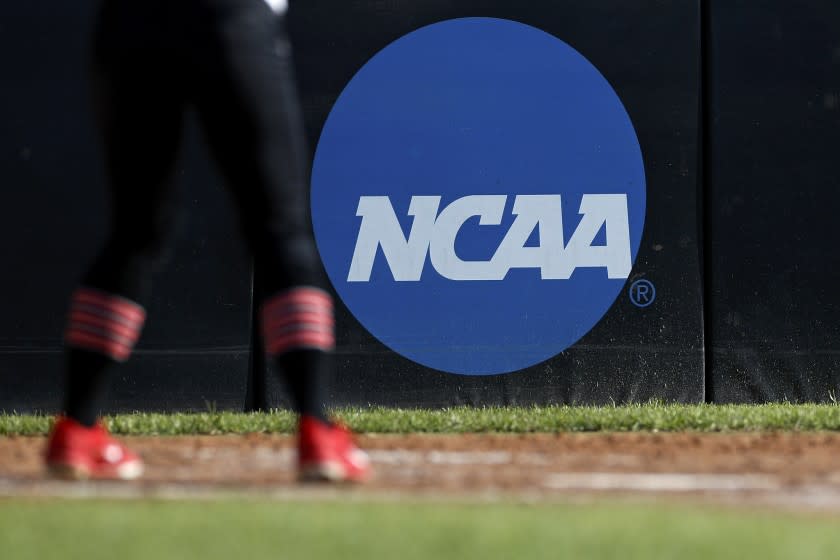NCAA grants spring sports athletes extra year of eligibility because of coronavirus

Less than 24 hours after the coronavirus pandemic prompted the NCAA to cancel all winter and spring championships, including events like March Madness and the College World Series, the governing body for college sports took another unprecedented step.
Spring athletes, facing the majority of their seasons being wiped out after conferences and schools suspended competition, will be granted another season of eligibility.
“Council leadership agreed that eligibility relief is appropriate for all Division I student-athletes who participated in spring sports,” the NCAA’s Division I coordination committee said in a statement Friday. “Details of eligibility relief will be finalized at a later time. Additional issues with NCAA rules must be addressed, and appropriate governance bodies will work through those in the coming days and weeks.”
The decision gives new life to the athletic careers of seniors who play spring sports — they include baseball, softball and women’s rowing — after many of them jolted to an end this week in a flurry of news releases by conferences and schools as the scale of the coronavirus outbreak came into focus.
Specifics about how Friday's decision will work with scholarship limits, roster size and other longstanding rules aren’t clear.
“I don’t see it as complicated as others might,” said David Ridpath, president of the Drake Group, which advocates for academic reform in college athletics, and an associate professor of sports administration at Ohio University. “It causes some minor changes for two to three years, but if the NCAA is about the athlete, this needs to be done and is fair. Any pitfalls can be dealt with. It’s a new normal and all must adjust.”
A memo distributed to member schools by the NCAA suggested the governing body thinks of the eligibility change “like a red-shirt year” and said there was “more to come” on how the change would impact financial aid and related issues.
The memo also left open the possibility of taking unspecified action to aid winter sports athletes.
“The NCAA is still discussing issues related to seasons of competition for winter sport student-athletes who were unable to participate in conference and NCAA championships, but nothing official has been decided at this point,” the memo said.
The initial cancellation of the spring championships provoked a furious response by senior athletes, some who were in the heart of their seasons.
“I’m sorry but I won’t and refuse to accept this as the end of my career,” Taryn Atlee, a senior infielder on Washington's powerful softball team, tweeted Thursday in response to the news. “It’s going to end competing for a national championship. PERIOD.”
Allison Wahrman, a member of Iowa’s track and field team, created an online petition calling on the NCAA to add a year of eligibility for impacted athletes. The petition received more than 200,000 signatures by Friday evening.
“We understand why the NCAA are taking these precautions and believe that the issue is bigger than sports,” Wahrman wrote. “However, having a year of eligibility taken away from these dedicated athletes simply is not right.”
After the NCAA announced the decision Friday, Wahrman tweeted: “PROGRESS!!”
"It’s really about trying to be agile enough to adapt to every situation," USC athletic director Mike Bohn said. "Because the student-athletes across the country are all going to have different unique aspects that are going to be deserving of consideration."
UCLA baseball coach John Savage welcomed the apparent solution.
“From a coach’s standpoint, I just have to trust that there’s common sense at the top when it relates to granting a year of eligibility,” he said. “You can’t penalize any player that’s played this season for 15, 16, 17 games and have them count as a year in a 56-game schedule. That’s not reasonable; it’s not fair. So I trust the NCAA, the Pac-12 and everybody that is going to make that sort of decision, that they have the best interest of our players and the best interest of the future of their eligibility.”
Savage, whose team went 13-2 before its season was canceled along with so many others, hopes the NCAA and Pac-12 will clarify if the athletes receiving an extra season will count against their team’s scholarship limit.
“This is something we’ve never seen before,” Savage said.
Along with the eligibility relief, the NCAA instituted a temporary dead period for in-person recruiting through at least April 15. The decision bars on- or off-campus recruiting for every sport, though phone calls and electronic communication still are permissible.
Staff writers Ryan Kartje and Thuc Nhi Nguyen contributed to this report.

